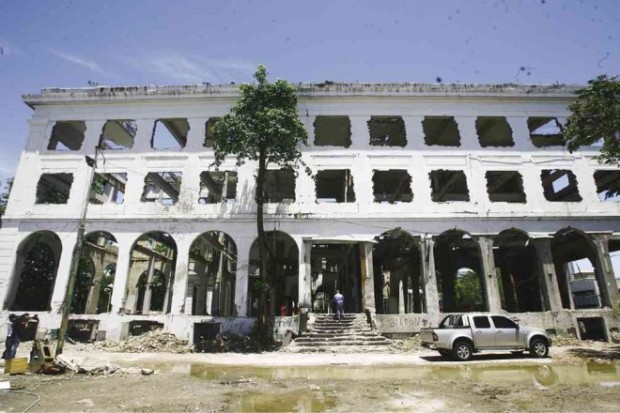CA junks VACC bid to stop conversion of Army Navy Club into hotel
The Court of Appeals has dismissed a petition filed by an anti-crime group to stop a hotel and spa corporation from completing the conversion of the former Army Navy Club in Manila into a boutique hotel.
In a six-page resolution, the appeals court’s 15th Division through Associate Justice Ramon Garcia instantly dismissed the petition for certiorari and prohibition filed by the Volunteers Against Crime and Corruption (VACC) against Oceanville Hotel and Spa Corporation for violating the principle on hierarchy of courts.
The CA said that while it has concurrent jurisdiction with the Regional Trial Court in issuing the writ of certiorari, direct resort is allowed only when there are special extraordinary or compelling reasons that justify the same.
In this case, however, the CA said “the present petition for certiorari is bereft of any compelling reason or circumstance to warrant an exception to the rule.”
The appeals court pointed out that while the petition primarily seeks to nullify the agreement among respondents Philippine Amusement and Gaming Corporation, the city government of Manila, National Historical Commission of the Philippines, Oceanville Hotel and Spa Corporation and Vanderwood Management Corporation for the development of the Army Navy Club, VACC’s proper remedy is to file a civil action for annulment of contract which falls under the jurisdiction of the trial courts.
Article continues after this advertisement“Neither certiorari nor prohibition is the remedy in the present case,” the CA pointed out.
Article continues after this advertisementThe appeals court also noted that the decision of the Manila City government to enter into an agreement with private entities for the development of the Army Navy Club and the approval of the development by the National Historical Commission of the Philippines (NHCP) cannot be considered a judicial, quasi-judicial or ministerial action that can be a subject of a petition for certiorari.
“The City of Manila’s execution of the lease contract with Oceanville Hotel and Spa does not fall within the ambit of judicial, quasi-judicial or ministerial function as the same is within its prerogative, powers and authority in the exercise of its executive function. On this court alone, certiorari and prohibition will not lie,” read the CA ruling.
In its petition filed last month, the VACC urged the CA to issue a temporary restraining order to stop the continuing construction activities at the Army Navy Club facility and after a hearing to issue a writ or preliminary injunction to stop its conversion into a hotel and casino gaming facility.
Last 2014, the city government of Manila entered into a lease contract with Oceanville for 25 years. Under the contract, Oceanville is allowed to sublease any part of the Army Navy Club.
The NHCP then approved Oceanville’s redevelopment plan to renovate and restore the facility for the purpose of using the facility as a boutique hotel whose plan was also approved by the city government.
Oceanville then entered into memorandum of agreement with Vanderwood for the sublease of a portion of the facility for 20 years or from November 2014 to November 2034.
Vanderwood then started construction of a casino gaming facility which it then subleased to Pagcor for a period of 15 years.
Last year, the VACC filed a P234 million plunder charges against former Pagcor chairman Celestino Naguiat, Pagcor Director Jose Tanjuatco, Directors Enriquito Nuguid, Eugene Manalastas, lawyer Jorge Sarmiento, Bids and Awards Committee member Milagros Pauline Visqui, Ramon Jose Jones, Romeo Cruz, Annalyn Zogimann, lawyer Kathlene Delantar, Manuel Sy, former government corporate counsel Raoul Creencia and Jose Christopher Manalo IV, former chairman of Pagcor’s technical working group for the award of the lease of space for a gaming facility in the Army and Navy Club to Vanderwood despite the latter’s non-submission of certain documents and non-compliance with some conditions indicated under the technical requirements of the bid.
Sy, Chairman of the Board of Vanderwood, maintained that there is nothing “irregular” in the lease deal with Pagcor. According to him, the procurement process went through several stages, “all independently undertaken by the various offices of Pagcor, thereby enforcing the system of checks and balances through the performance of the distinct functions of different offices.”
Originally designed as a rest and recreation area for the exclusive use of military personnel and civilians from the United States, the Army Navy Club went on to become the venue for many important milestones in Philippine-American history.
It is one of the country’s earliest examples of Neo-colonial revival architecture as designed by the renowned William Parsons. It was built by the US Army Corps of Engineers and completed in April 17, 1911.
Despite opposition from groups such as VACC, many supporters were quick to praise the restoration of the historical site. “I am totally fascinated. It is remarkable that it is going back so beautifully”, states John Tewell, archivist of old Philippine photographs and history enthusiast.
Retaining the original 74-room lay-out, the Army Navy Club reportedly took P800 million to restore.
